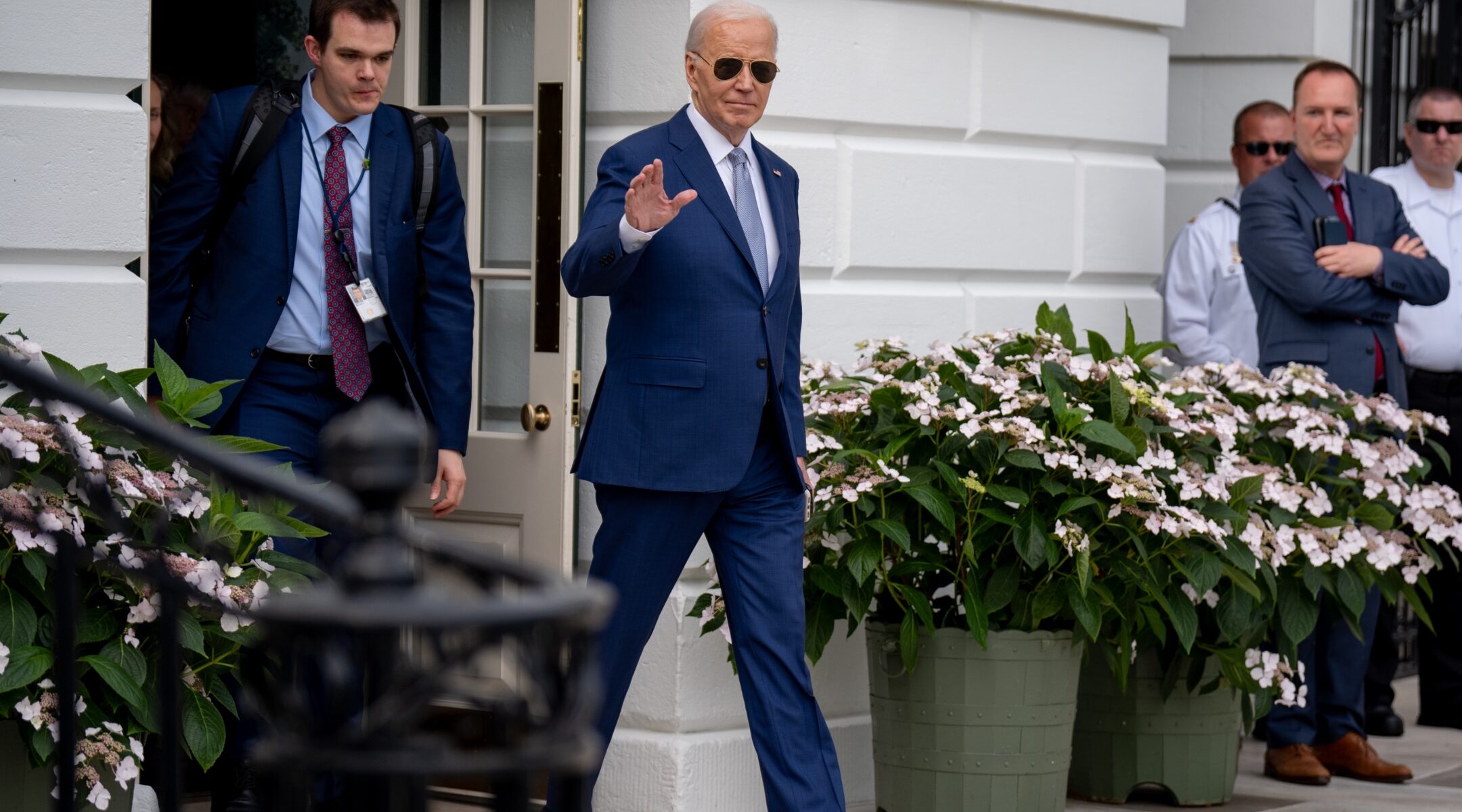WASHINGTON (JTA) — John Kirby, the National Security Council spokesman who has become the face of the Biden administration’s affection for Israel, had something to get off his chest: Joe Biden is not anti-Israel.
“The arguments that somehow we’re walking away from Israel fly in the face of the facts,” Kirby said Thursday in a briefing call with reporters, his voice rising with passion.
Kirby was speaking a day after the president confirmed that he had suspended the delivery of some large bombs to Israel as it prepared to enter Rafah, the city on the Gaza-Egypt border believed to be the last redoubt of a major Hamas force. Biden’s decision led to dismay across a wide swath of pro-Israel leaders, and was seized on by Republicans eager to court the Jewish vote.
Biden stands at risk of losing a pro-Israel reputation that he has, for decades, nurtured as a matter of personal pride, and that he hoped to rely on in an election year.
“Delaying arms transfers to Israel is dangerous,” the American Israel Public Affairs Committee said in an action alert to its members. In its messaging since Oct. 7, when Hamas launched its war against Israel, the pro-Israel lobby has repeatedly cited Biden’s pro-Israel record. “America must continue to stand firmly with our ally Israel as it works to defeat Hamas and defend its citizens.”
Abe Foxman, the retired national director of the Anti-Defamation League, who broke with decades of nonpartisanship in 2020 and campaigned for Biden, said Biden faced electoral peril, at least among Jewish voters, who have long favored Democrats.
“I hope that the response to what happened yesterday will send a message to him, that it’s not only Republicans that are criticizing you, but also Democrats,” Foxman said in an interview. “Arms sales during a war is a red line for most American Jews right now, center, even left. The only way to fix it is to turn it around.”
Haim Saban, the Israeli-American entertainment mogul who is a major donor to Democrats, emailed the campaign with an implied warning: “Let’s not forget that there are more Jewish donors who care about Israel than Muslim voters who care about Hamas,” he said in a note that circulated widely on social media. “Bad…bad…bad… decision on all levels.”
But Biden got support from at least one prominent Jewish official with a long record of supporting Israel: Sen. Chuck Schumer, the Jewish New York Democrat and Senate majority leader, told The Hill that “I believe that Israel and America have an ironclad relationship, and I have faith in what the Biden administration is doing.” Pro-Israel groups on the left, including J Street, Americans for Peace Now and the Jewish Democratic Council of America, also issued supportive statements.
Biden spoke to CNN a day after he marked Holocaust Remembrance Day at the Capitol, pledging to keep remembrance of Oct. 7 alive and to maintain his “ironclad” support for Israel.
“Yesterday, I commended [Biden] for his speech,” Nathan Diament, the Orthodox Union’s Washington director, said on X. “Today’s threat to withhold arms from Israel betrays this truth.”
Biden fiercely defended Israel in the days and months after Oct. 7, when Hamas terrorists launched the war, massacring some 1,200 people in Israel and taking approximately 250 hostage. But he has also watched with increasing concern as Israel launched massive counterstrikes, leading to the deaths of more than 34,000 Palestinians, according to local officials, leveling large parts of Gaza and leaving its population in a humanitarian crisis.
Biden throughout his career has made his attachment to Israel central to his political identity. He calls himself a Zionist, and says he has been since he was a child, when his Roman Catholic father thrilled to the establishment of Israel as a miracle.
“I mean, this is a president who visited Israel within days of the October 7 attacks, this is a president who rushed additional military articles to Israel and frankly, provided expertise from our own military to go over there to help them as they thought through their planning and their operation of these structures,” said Kirby (who himself has worn dog tags reading “Bring them home now” to call attention to Israeli hostages still in captivity).
Biden is caught in an electoral bind between a Democratic base that is increasingly turning against Israel and the anxieties of a Jewish community that has for decades reliably aligned itself with the party and remains mostly supportive of Israel.
“There’s just no question in my mind that it is hurting him with the larger pro-Israel community,” said a senior pro-Israel Democrat, who asked not to be named to speak frankly. “And I see that in my inbox, I see it in people on Twitter that are talking about changing their positions. I’m still going to vote for him. A number of people aren’t.”
Republicans seized it as an opportunity to make gains in a community that steadfastly votes in large majorities for Democrats.
Former President Donald Trump, the presumptive Republican nominee this year, once again chastised American Jews for favoring Biden.
“If any Jewish person voted for Joe Biden they should be ashamed of themselves,” he said outside the courtroom in New York where he is standing trial for falsifying business records. “He’s totally abandoned Israel.”
The GOP leaders in both chambers, House Speaker Mike Johnson of Louisiana and the Senate minority leader, Kentucky’s Mitch McConnell, wrote a letter to Biden on the issue. “We believe that security assistance to Israel is an urgent priority that must not be delayed,” they said.
Sen. Joni Ernst, an Iowa Republican, spearheaded a letter from Senate Republicans demanding answers. “You promised your commitment to Israel was ironclad,” the letter said. “Pausing much-needed military support to our closest Middle Eastern ally signals otherwise.”
Israeli Prime Minister Benjamin Netanyahu, whose relationship with Biden has become more parlous in recent weeks, used a message marking Israel’s Independence Day, which falls next Tuesday, to recall how Israel stood against world opinion in 1948.

Relatives of Palestinians killed during an Israeli attack mourn as their bodies are taken from Al-Najjar hospital morgue for burial in Rafah, Gaza, April 4, 2024. President Biden is caught in an electoral bind between a Democratic base that increasingly demands restrictions on U.S. assistance to Israel and the anxieties of a Jewish community that wants Israel to have the tools it needs to defeat Hamas. (Ahmed Zaqout/Anadolu via Getty Images)
“There was an arms embargo on Israel, but with great strength of spirit, heroism and unity among us — we were victorious,” Netanyahu said in Hebrew.
The notion that Biden is embargoing Israel infuriated Kirby, who emphasized repeatedly that the suspension was confined to a limited class of weapons and that American arms otherwise continue to flow to Israel.
Biden “also said yesterday that he will continue to ensure that Israel has all the military gains it needs to defend itself against all of its enemies, including Hamas,” he said. “He’s going to continue to provide Israel with the capabilities that it needs.”
Still, no president has withheld weapons from Israel as a means of pressure for more than 40 years, and some of the most consistently pro-Biden voices in the pro-Israel community were upset.
“We are disheartened by the partial withholding of U.S. military support from Israel while the threats from Hamas and other actors hostile to Israel are acute, and when the U.S.-Israel partnership should be at its strongest,” said the Israel Policy Forum, a group that dedicates itself to advancing a two-state outcome to the conflict and has a board replete with donors to Democrats.
Michael Koplow, the IPF’s chief policy officer, said Biden’s messaging team was flatfooted, allowing his rivals to seize the narrative by coming out first with news of the suspension of aid and only then explaining that it was limited to certain weapons.
“There are too many people who are talking about this as if there’s now a U.S. arms embargo on Israel or even as if the U.S. has cut off all offensive weapons to Israel, which is not even not even close to being true.”
The Democratic Majority for Israel, which runs a political action committee that has made Biden’s support for Israel central to its advocacy, said it was “deeply concerned.”
“A strong U.S.-Israel alliance like the one President Biden has created, plays a central role in preventing more war and making the path to eventual peace possible,” it said in a statement. “Calling the strength of that alliance into question is dangerous.”
The office of New York Rep. Hakeem Jeffries, the minority leader in the House, did not return multiple requests for comment.
Joel Rubin, a Jewish Democrat and former senior State Department staffer who has advised a number of campaigns, said Biden had considered an American electorate that since the Iraq war debacle 20 years ago has been wary of open-ended conflict.
“What Biden is trying to force the Israelis to do is to say, ‘Tell me how this ends’,” he said. “The American people overall will reward him at the polls for having a vision that gets us to an endpoint that leads to stability and calm. That’s the constituency he’s aiming for overall.”
JTA has documented Jewish history in real-time for over a century. Keep our journalism strong by joining us in supporting independent, award-winning reporting.






